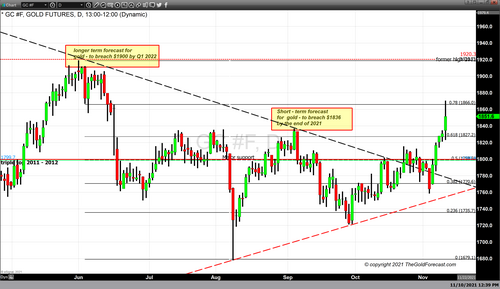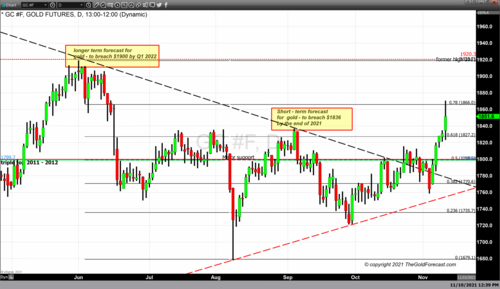

Yesterday's article addressed whether or not gold was positioned for a large upside breakout. We cited that the upcoming CPI (Consumer Price Index) numbers which were released today, would be a huge component to answer that question. Our technical studies indicated that a break in gold futures above $1835 would be a trigger for a strong breakout or price search. That is exactly what we saw today. However, the rise in inflation for October surpassed any of my expectations.

Not since 1990 has the inflation rate come in over 6% year over year. In September, we saw inflationary pressures decline from 5.4% to 5.3%, and many analysts including myself, expected inflation to continue to rise. Analysts and economists polled by the Wall Street Journal were predicting that we would see a rise of inflationary pressures by 0.6%. The actual numbers were much more alarming with inflation last month climbing almost a full percentage point, with the government’s report indicating a rise of 0.9%, taking the year-over-year inflationary rate to 6.2%.
Since 1990 inflationary pressures have risen, but never to 6% or above. That all changed today when the CPI for October climbed to 6.2%. The primary factors for the accelerated rate at which inflation has been growing are attributed to rising energy and food costs. Oddly, the Federal Reserve prefers to use the PCE (Personal Consumption Expenditures) inflationary index, which strips out energy and food prices from the calculations.
This means that the PCE inflationary index will not accurately define the current levels of inflation as the Federal Reserve uses that index to base its monetary policy decisions. However, I find it hard, if not impossible for the Federal Reserve to ignore the numbers. The prior PCE inflationary index indicated a year-over-year inflationary rate of 4.4%, which is still more than double the inflationary target of 2%. However, government data indicated that even the PCE rose by 0.6%, taking the core inflation rate from 4% to 4.6%.
Simply put, the Federal Reserve has backed itself into a corner as they continue to assume that current inflationary pressures are transient and will slowly dissipate. They’re certainly in the minority when it comes to the question of whether or not current inflationary pressures are transitory or persistent. Most economists agree with the Federal Reserve in that a component of the rising inflationary rate is due to supply chain shortages and labor shortages. But much of the recent inflationary pressures will be persistent over the next 2 to 3 years. Energy costs continue to rise with many analysts anticipating that oil will reach $100 per barrel again. Food costs continue to be problematic as Americans see their dollar buying much less in terms of goods and services they depend on.
Gold today had a dramatic increase after the release of October’s CPI inflationary index. Gold futures basis the most active December 2021 contract traded to a high of $1870 before retracing. As of 5:25 PM EST, the December contract is currently fixed at $1851.60 after factoring in today’s net gain of $20.80. More impressive is the fact that we saw gold even after four consecutive days of higher pricing surge to the highest pricing seen since June of this year. The chart we have included in today’s article is an updated version of the chart we published yesterday showing the strength of the breakout. For the last couple of months, our technical studies have indicated that gold will reach $1835 by the end of the year. If anything, we underestimated the timeline to get there.
The studies also concluded that gold will challenge $1900 by the first quarter of 2022. We might see that forecast come in sooner than we originally believed.
By Gary Wagner
Buy, Sell Gold and Silver, with Free Storage and Monthly Yields
